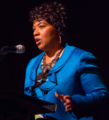Emory University
Emory University is a private research university in Atlanta, Georgia. It was founded in 1836 as Emory College by the Methodist Episcopal Church and named in honor of Methodist bishop John Emory.[18] Its main campus is in Druid Hills, 3 miles (4.8 km) from Downtown Atlanta.[19]
Former name
Emory College (1836–1915)
Cor prudentis possidebit scientiam (Latin)
"The wise heart seeks knowledge"[1]
1836[2]
$11 billion (2021)[9]
32,594 (2020) includes approx. 24,000 health care employees[11]
15,909 (Fall 2022)[12]
8,155 (Fall 2022)[12]
7,754 (Fall 2022)[12]
Large city[13], 631 acres (255 ha)
Eagles
- Swoop the Eagle
- Dooley the Skeleton
Emory is composed of nine undergraduate, graduate, and professional schools and enrolls nearly 16,000 students from the US and over 100 foreign countries.[20] Emory Healthcare is the largest healthcare system in the state of Georgia[21] and comprises seven major hospitals, including Emory University Hospital and Emory University Hospital Midtown.[22] The university operates the Winship Cancer Institute, Yerkes National Primate Research Center, and many disease and vaccine research centers.[23][24] Emory University is adjacent to the U.S. Centers for Disease Control and Prevention (CDC) and is a long-time partner in global and national prevention and research initiatives. [25] Emory University is the leading coordinator of the U.S. Health Department's National Ebola Training and Education Center.[26] The university is one of four institutions involved in the NIAID's Tuberculosis Research Units Program.[27] The International Association of National Public Health Institutes is headquartered at the university.[28]
Emory University has the 15th-largest endowment among U.S. colleges and universities.[9] The university is classified among "R1: Doctoral Universities – Very high research activity"[29] and is cited for high scientific performance and citation impact in the CWTS Leiden Ranking.[30] Emory University was elected to the Association of American Universities in 1995.[31]
Emory faculty and alumni include 1 President of the United States, 2 Prime Ministers, 9 university presidents, 11 members of the United States Congress, 2 Nobel Peace Prize laureates, a Vice President of the United States, a United States Speaker of the House, and a United States Supreme Court Justice. Other notable alumni include 21 Rhodes Scholars and 6 Pulitzer Prize winners, as well as Emmy Award winners, Grammy Award winners, MacArthur Fellows, CEOs of Fortune 500 companies, heads of state and other leaders in foreign government.[32] Emory has more than 165,000 alumni, with 75 alumni clubs established worldwide in 20 countries.[20][33][34]
Undergraduate admissions statistics
10.6%
1470–1560
33–35
31
22
55
20
101–150
166=
106=
72
Athletics[edit]
Emory's 18 varsity sports teams, known as the Eagles, are members of the NCAA's Division III in the University Athletic Association (UAA). Emory consistently ranks among top schools in the Directors' Cup of the National Association of Collegiate Directors of Athletics (NACDA) for best all-around athletics program.[173]
Emory University has over 13,200 faculty and staff members and over 133,000 living alumni. Awards and honors recognizing Emory alumni and faculty include the Nobel Peace Prize, Pulitzer Prize, Presidential Medal of Freedom, Bancroft Prize, Booker Prize, Lenore Marshall Poetry Prize, National Humanities Medal, Peabody Award, Breakthrough Prize in Life Sciences, Guggenheim Fellowship, Fulbright Fellowship, American Mathematical Society Fellowship, MacArthur Fellows Program, Rhodes Scholarship, Marshall Scholarship, and membership in the American Academy of Arts and Sciences, Carnegie Foundation for the Advancement of Teaching, Howard Hughes Medical Institute, American Society for Clinical Investigation, National Academy of Sciences, and National Research Council.[174][175]
Notable alumni include Alben Barkley (BA 1900),[176] 35th Vice President of the United States; Isaac Stiles Hopkins (1859C)[177] and Robert Stewart Hyer (BA 1881, MA 1882),[178] founding presidents of Georgia Institute of Technology and Southern Methodist University, respectively; Young John Allen (1858C),[179] American Methodist Missionary in the late Qing Dynasty, China; Thomas Milton Rivers (1909C);[180] Dumas Malone, Jefferson biographer and director of the Harvard University Press (AB, 1910); Director of the Rockefeller Institute; Ernest Cadman Colwell (1923C, 1927 PhD),[181] President of the University of Chicago; Bobby Jones (Law 1929),[182] the only golfer to win a Grand Slam, founder of the Masters Golf Tournament, and regarded as one of the greatest golfers of all time; Ely Callaway Jr. (1940C),[183] Founder of the Callaway Golf Company; Ernie Harwell (1940C),[184] baseball broadcaster for the Detroit Tigers; Arnall Patz (BA 1943, MD 1945),[185] Lee Hong-koo[186] (1959C), 26th Prime Minister of the Republic of Korea; Newt Gingrich (BA 1965),[187] 58th Speaker of the House of Representatives; Sonny Carter,[188] NASA astronaut, Crew member of STS-33 Space Shuttle mission (1969C); Peter Buck, guitarist for the band R.E.M.;[189] Kenneth Cole (BA 1976),[190] clothing designer and founder of Kenneth Cole Productions; Christopher McCandless (1990C),[191] Alaskan wilderness adventurer and main subject of Jon Krakauer's Into the Wild; Fala Chen (2005C),[192] Chinese American Actress; Kirsten Haglund (2013C), Miss America 2008;[193] Duncan L. Niederauer, chief executive officer of the New York Stock Exchange (NYSE);[194] Elizabeth Prelogar (BA 2002), 48th Solicitor General of the United States.[195]
Notable faculty include Jimmy Carter, 39th president of the United States;[196] Sir Salman Rushdie, Booker Prize-winning novelist;[197] Desmond Tutu, Nobel Peace Prize recipient;[198] William Foege,[199] tenth Centers for Disease Control and Prevention director; Nathan McCall, New York Times bestselling author;[200] James T. Laney,[201] 17th president of Emory University, United States ambassador to Korea from 1993 to 1997; Natasha Trethewey, Pulitzer Prize winner;[202] and US poet laureate John L. Coney and Dr. Sanjay Gupta, CNN chief medical correspondent.[203]















